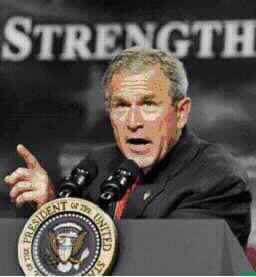HIGHLIGHTS: Bush & Cheney Make Clear No Decision Has Been Taken on Iraq||Key U.S. Allies Back Away From Iraq Attack||Iraq Defiant over U.S. Threats|| STORY: President Saddam Hussein announced plans to address his nation as nervous Iraqis feared war was inevitable, while President Bush said on Wednesday Baghdad posed "real threats" but that he would consult with Congress and allies on how to proceed.
Bush and Vice President Dick Cheney made clear no decision had been made to go to war to oust Saddam. But Cheney also said a return of U.N. weapons inspectors to Iraq may not resolve concerns over Baghdad's ability to develop weapons of mass destruction.
During a speech in San Francisco, Cheney cautioned that the threat posed by Saddam's pursuit of weapons of mass destruction could not be wished away and that the United States would not ignore the dangers posed by "a dictator who is clearly pursuing these capabilities."
"Many of us, I think, are skeptical that simply returning the inspectors will solve the problem," Cheney said.
"The president has not made a decision at this point to go to war," he added. "The international community will have to come together in some fashion and figure out how we're going to have to deal with this growing threat."
Saddam was set to make a "comprehensive national speech" on television on Thursday morning, the Iraqi News Agency said. The announcement came as Iraq's foreign minister launched a stinging attack on chief U.N. arms inspector Hans Blix.
KEY US ALLIES BACK AWAY FROM IRAQ ATTACK
Key U.S. allies have been urging the United States not to launch a strike against Iraq in an attempt to carry out the official U.S. policy of a "regime change" in Baghdad. Arab leaders are adamantly opposed to such a move.
Iraq offered last week to discuss the possible return of U.N. weapons inspectors, placed in Iraq after the Gulf War but withdrawn in 1998 on the eve of a U.S.-British bombing raid. A resumption of inspections aimed at stopping Iraq from acquiring weapons of mass destruction could increase pressure on the United States from its European and Arab allies not to attack.
In an interview published Wednesday, German Chancellor Gerhard Schroeder said military action would wreck the international front fighting terrorism worldwide and in Afghanistan, throw the Mideast into turmoil and hurt the world economy.
In Britain, a country seen as President Bush's strongest backer against Iraq, Mike O'Brien, Foreign Office minister for the Middle East, suggested Baghdad's recent gesture to readmit weapons inspectors could make military action unnecessary.
IRAQ DEFIANT OVER U.S. THREATS
Iraq's foreign minister meanwhile says his country will not give in to pressure from the United States and Britain over arms inspections.
Speaking in an interview with the BBC in Baghdad, Naji Sabri reiterated that Iraq would only readmit United Nations arms inspectors if the economic sanctions against Baghdad were also lifted.
He also warned that Iraq would defend itself if attacked, and ridiculed US and British claims that the country was developing weapons of mass destruction or threatening its neighbours.
Giving a flavor of the mood among Saddam's loyal elite, the speaker of Iraq's parliament, Saadoun Hammadi, told an extraordinary session, "Threats against Iraq will not intimidate anyone and they are doomed to fail."
"Our people are united, our faith is strong, our means are mobilized and active and our material and spiritual abilities are great," Hammadi added.
PHOTO CAPTION
While Iraqi President Saddam Hussein announced plans to address his nation, President George W. Bush said August 7, 2002 that Baghdad posed 'real threats' and would consult with Congress and allies on how to proceed. Bush, seen speaking to guests at a 'Mississippi Welcome' while in Madison, and Vice President Dick Cheney made clear no decision had been made to go to war to oust Saddam. (Larry Downing/Reuters)
- Author:
& News Agencies - Section:
WORLD HEADLINES


 Home
Home Discover Islam
Discover Islam Quran Recitations
Quran Recitations Lectures
Lectures
 Fatwa
Fatwa Articles
Articles Fiqh
Fiqh E-Books
E-Books Boys & Girls
Boys & Girls  Hajj Rulings
Hajj Rulings Hajj Fatwas
Hajj Fatwas














